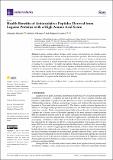| dc.description.abstract | Legumes such as soybean, chickpea, lentil, cowpea, and mung bean, are valuable sources
of protein with a high amino acid score and can provide bioactive peptides. This manuscript presents
a review on legume-derived peptides, focusing on in vitro and in vivo studies on the potential
antioxidative activities of protein hydrolysates and their characterization, amino acid sequences,
or purified/novel peptides. The health implications of legume-derived antioxidative peptides in
reducing the risks of cancer and cardiovascular diseases are linked with their potent action against
oxidation and inflammation. The molecular weight profiles and amino acid sequences of purified
and characterized legume-derived antioxidant peptides are not well established. Therefore, further
exploration of legume protein hydrolysates is necessary for assessing the potential applications of
antioxidant-derived peptides in the functional food industry. | en_US |

